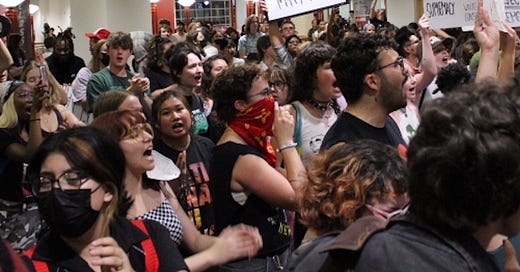Suppose you bought tickets to a show, or a concert, or a movie, and someone decided that, no, you should not get to see or hear that which you chose, of your own volition, to attend. That someone, objecting to the show or concert or movie for whatever reason, decided to drown out whomever was on stage or screen, or otherwise disrupt the event, because he didn't like the content or the person(s) that you chose, again of your own free will and with your own money, to attend.
How many names might you come up with to describe that person?
Would "sympathetic activist" be among them?
Or would you come up with "narcissist," "jackass," "wanker," "tosser," "stupid git," or worse?
Would you acknowledge the disruptor as engaging in "counter-speech" and accept the denial of your choice to listen?
Or would you be angry that your decision to watch and listen was interfered with?
Every time I hear of a college protest disrupting a speaker, this occurs to me. If people are attending the speaker's presentation, they are there to hear what he has to say. Not necessarily to agree, but normal humans are capable of listening to opinions they don't share without turning into sky-screamers or puddles of pathetic performance art.
Somehow, somewhere along the way, young people got it in their heads that they have the right to intercede in other people's decisions. That their right to protest extends beyond standing outside a theater or lecture hall and into the space itself, where co-equal humans are engaging in the consensual act of speaking and listening.
Do such entitled asses as the Stanford Law School students who shouted down Fifth Circuit judge Kyle Duncan and disrupted the event to which he was invited understand that they are not engaging in liberty-based behaviors? That they acted coercively and infringed on the rights of everyone who wanted to hear what the Judge had to say? Do they understand that listening is not agreeing or condoning, or that they are being as censorious as the book-burners, real and imagined, they decry?
Orwell warned us of such people and such behavior in Animal Farm:
At the Meetings, Snowball often won over the majority by his brilliant speeches, but Napoleon was better at canvassing support for himself in between times. He was especially successful with the sheep. Of late the sheep had taken to bleating "Four legs good, two legs bad" both in and out of season, and they often interrupted the with this. It was noticed that they were especially liable to break into "Four legs good, two legs bad" at crucial moments in Snowball's speeches.
You have a right to speak, and you have a right to listen. You also have a right not to listen, but you cannot elevate that right above the rights of anyone else. If you don't want to listen to someone, don't go to his speech. If you want to protest that someone, you can do so without trespassing and without disrupting others' right to listen, or schedule your own time to speak, or stand and comment during a Q&A. To interfere with that right to listen is to be a fascist thug, not a defender of liberty or the oppressed or of the Good and Proper. To accept others' denial of the right to listen is to be complacent in that fascism. To normalize that behavior puts a smile on the face of every authoritarian politician, who would be all too happy if free speech went away.
I think that the right response to these cancelers (serendipitously, Autocorrect offered me "cancers" as I was typing) is to challenge them on the right to listen. They've already made it clear they don't respect the individual right to speak when they disapprove of what they think will be said, so arguing that angle is apt to be fruitless. An “I want to hear what he has to say,” or a "how about you let me decide for myself if this dude is wrong or evil" might set them back on their heels, even if for just a moment, and might shake a few of them loose of the idiot tree.





I think this goes back to the response to bullying in Schools and then on Social Media.
That Words hurt and cause real harm.
which then morphed into Words are violence.
this in the protestors minds make the disruptions justified.
they think they are protecting victims.
This idea that the general public cannot be trusted to hear words that haven't been filtered through a euphemism machine without turning into violent bigots has morphed into this phenomenon of protesting free speech.